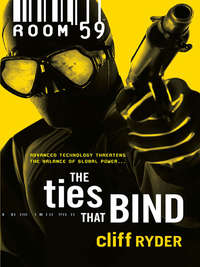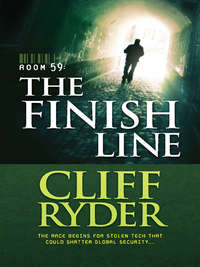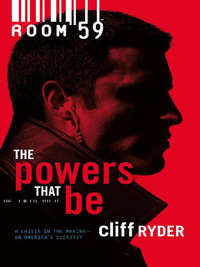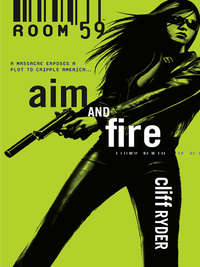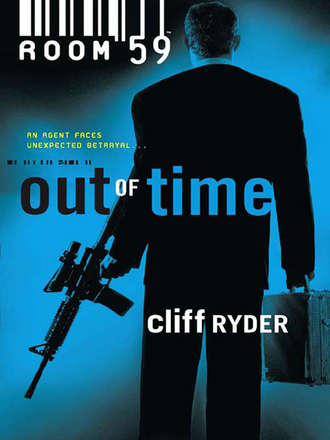
Полная версия
Out Of Time

If he moved quickly enough he might be able to assume a new disguise
As he stepped through the doorway, he heard a shout from his right. He’d been spotted. He lunged for the door, but this time the effort proved too much. His left leg suddenly gave out and he tumbled to the side with a cry of pain. A shot rang out and something struck him hard on the shoulder, spinning him out of control.
Alex managed to get his 9 mm out of the holster. He heard cursing and shouts, but for some reason the words wouldn’t register. He crashed into the wall and pain shot through his shoulder, already soaked in blood. He gritted his teeth and tried to stand, but his legs would not support him. He raised his gun, watching for movement.
Two men appeared, crouching low and moving down opposite sides of the passageway. He took aim at the man on the left and fired, saw the round strike him mid-chest and blow him off his feet. Alex tried to roll to his right, but somewhere between his brain and his legs, the signal went haywire. What was supposed to be a smooth roll turned into a flop and he landed heavily as another searing pain brushed his temple.
Everything went black.
Out of Time

Cliff Ryder

www.mirabooks.co.uk
Special thanks and acknowledgment to Garrett Dylan for his contribution to this work.
Contents
Chapter 1
Chapter 2
Chapter 3
Chapter 4
Chapter 5
Chapter 6
Chapter 7
Chapter 8
Chapter 9
Chapter 10
Chapter 11
Chapter 12
Chapter 13
Chapter 14
Chapter 15
Chapter 16
Chapter 17
Chapter 18
Chapter 19
Chapter 20
Chapter 21
Chapter 22
Chapter 23
Chapter 24
Chapter 25
Chapter 26
Chapter 27
Chapter 28
Chapter 29
Chapter 30
Chapter 31
Chapter 32
1
Alex Tempest leaned on a dirt-crusted stone wall, head lowered, trying to control his breathing and ignore the pain. His legs felt like gelatin and sent sharp, stabbing jolts of agony into his hips; his head spun with a sudden wave of nausea. Every muscle was bowstring tight and his heartbeat ragged—every sound brought a flinch and a shift of disoriented senses.
The sun had begun to set over the Mexico City skyline, but the heat continued to roll off the streets in waves. On the floor of a villa just outside of town, Vincenzo Carrera lay dead in a pool of blood. His men hadn’t stopped to clear away the body, the blood or any of the evidence. They hadn’t even disposed of the kilo-sized bag of cocaine, blown to bits and strewed across the inlaid mosaic of Carrera’s garden. The powder floated about like fine drifts of snow. Carrera would never spend the money he’d expected to make on that sale. He would not make his reservations at La Villa Cordoba, nor his date with his wife and young daughter the following day at the beach.
All that remained of Carrera was his well-oiled organization, designed to sell drugs and kill or destroy anything that got in its way. It wasn’t supposed to have mattered. In, remove the target and out. That was the plan. That was always the plan. Alex wasn’t known as “the Chameleon” without good reason. He had worked his way into incredibly tight spots, killed and disappeared countless times. This wasn’t even one of his more difficult assignments.
But something had gone wrong. Something had been going wrong for some time, in fact, and though he’d tried to ignore it, it only grew worse as each day passed. This time it had nearly cost him both the success of his mission and his life.
As he waited for the shadows to deepen and his legs to stop shaking, he went over the mission again, trying to see if there was anything he could have done differently, trying to see where he’d gone wrong. Somewhere there was an error, a stupid error and he hated stupidity almost as much as he hated the trembling in his normally steady hand.
The earlier stages had gone exactly as he’d foreseen. It wasn’t his first trip to Mexico City and his old contacts were in place. He’d managed to infiltrate the lower levels of Carrera’s organization without incident, had marked his time and his place. It had taken two weeks of careful watching and listening to be certain he had it right.
Carrera had been too arrogant to distance himself from his business and his organization was too dangerous to be left without close control. It had only been a matter of time until a deal went down and Alex was close enough to the center of the operation to pin it down. They weren’t secretive in their activities once inside the walls of Carrera’s villa. Whom did they have to fear? Enough of the local policia were on the take to ensure secure operations and no business ever took place on the streets or in an unsecured location. Again, what would be the purpose?
Alex had slipped into the deep center of the garden shortly before the deal was set to go down, his tan skin darkened with a touch of makeup and his clothing already a perfect match to what the guards of the villa were wearing. There were five posts along the villa’s wall and he’d placed himself very near one of these. The guard hadn’t seen or heard him—he was searching for threats from outside the villa, not from within.
Just before 5:00 p.m., he’d slipped up behind the guard, slit his throat and took his place, watching the streets beyond the walls carefully. He moved and acted exactly as the guard would have—a professional doing his job. There was no reason anyone would look at him twice and no one had. The damned plan was perfect.
At five o’clock sharp, Carrera appeared in the garden. He sat where he sat every afternoon, and a young girl brought refreshments. He ate fruit, and he laughed with the two bodyguards who were never far from his side. They were short, squat men with dark hair, dark glasses and no smiles. They made a quick sweep of the garden. They glanced up at each guard post. They didn’t take any special notice of Alex. He paid no attention to them, willing them to see only what he wanted them to see—a guard on duty.
At half past five, a long white sedan wound its way up the long driveway to the villa. It stopped just shy of the iron gates. Men poured out of twin guard shacks on either side of the gate, scanning the passengers, opening the trunk and searching quickly, checking the engine and sweeping beneath the undercarriage with mirrors. Slick, quick and efficient. Alex appreciated that—under other circumstances he might have admired it.
The gates opened and the car slid in, moving at a leisurely pace. Alex watched, lost sight of the vehicle and turned his attention back to the streets. For the moment, his duty was to protect. He kept his rifle, a modified Russian SVN-98, with the barrel tipped toward the street, but low enough that anyone watching from beyond the fence couldn’t see it. They knew, of course. The police knew, the locals knew, everyone knew better than to approach the fence, but that was no reason to let down the guard. He knew what was expected, and that was what he became. It was how he operated, how he survived.
The Chameleon absorbed his environment, took on its colors.
The deal went down moments later. There were no formalities. Carrera’s men escorted a small party from the villa to the garden. There were three men. One carried a banded metal case. The other two were mirror images of Carrera’s men—short, squat, expressionless. They didn’t glance around, but Alex knew they were aware of every detail. Their lives and the life of their leader depended on it. It was all like clockwork, and that was what was supposed to make it simple.
The money was counted. The drugs were presented for inspection. Carrera lounged in a chair, indifferent to the proceedings. The man who had carried the case moments before scooped a small sample onto his finger, tasted it quickly, then pulled a smaller case from his pocket. He took out a glass bottle, dropped a bit of the powder into it, added liquid and shook. That was the moment.
Alex knew that no one would be able to resist watching that bottle. Either the drugs were good, and the white sedan would glide back out the gates the way it glided in, leaving Carrera to count the cash, or it was a setup, an ambush meant to send some message to a lesser dealer or a competitor. It mattered little to Alex. Every set of eyes was locked on the bottle, and in that moment, he struck.
He shifted the rifle in the blink of an eye and sighted in on Carrera through the integrated scope. There was no time to hesitate, but Alex was a crack shot. It was thirty feet down the opposite side of the wall, but he’d already rigged a line. The entire operation should have taken, by his calculation, about forty seconds.
The crosshairs rested on Carrera’s heart, and Alex curled his finger around the trigger, preparing to gently squeeze off the single round that would end Carrera’s life. Except, at that moment, his hand began to shake. Not a small tremor, but an uncontrollable spasm that wrenched his fingers into a locked claw. He fought to control it, and pulled the trigger instinctively. The slug slammed into the bag of cocaine and sent a cloud of powder into the air. In that momentary confusion, cursing to himself, he resighted, pulled the trigger again, and blood spouted from Carrera’s temple—the only part of him that was visible above the tabletop.
Carrera was dead, but the damage to the mission was done. Men were already on the move.
Alex dropped the gun and grabbed at his line. He slid down quickly, rappelling down the sheer stone face. The muscles of his hand clenched again, so tight that he nearly cried out. He dropped too quickly and fought for control. He heard voices calling out in the distance. He heard gunfire, probably the buyer’s men crossing with Carrera’s in the confusion. He heard the roar of an engine, and he knew they’d seen him. He hadn’t gotten over the wall quickly enough.
He hit the ground moving far too quickly. He braced, released the line and rolled, but pain shot through his legs—more pain than there should have been—and it was all he could do to keep his feet. There was a hundred yards before he’d be near any sort of cover. The first side street consisted of lines of small houses, all the same, most of them uninhabited. The few that weren’t empty held Carrera’s men and their families. It was a small demilitarized zone, more for camouflage than habitation.
Behind the second house on the left side of the street, he’d parked a Ducati dirt bike, small, powerful and maneuverable. He heard sounds of pursuit, too close. As he ran, he tossed aside his jacket and shirt. Dangling from the handlebars he’d left a dirty serape that many of the natives here wore. He whipped it over his shoulders, slid his arms in and dropped heavily onto the bike. His legs tingled as though they’d fallen asleep, and ice picks stabbed at his hips. His vision darkened for a moment from the sudden pain, and he nearly blacked out. He gritted his teeth, punched himself in the thigh repeatedly and kicked the engine to life.
He spun out and around the corner as the first wave of Carrera’s men swept out the gates and into the streets, searching for likely targets. It was five miles to the center of the city, where the streets would be busy with people and tourists and where the police would have to make at least an attempt to pay attention. Alex blinked and gripped the handlebars tighter, his hands like talons. His eyesight blurred and it was all that he could do to keep the Ducati upright.
For a time he operated on pure instinct, and the bursts of gunfire and the roar of engines at his heels became the sounds of dreams on awakening—distant and unreal. He was the Chameleon, and he needed only to disappear.
He dumped the bike at the edge of a small market, running between carts overladen with fruits and vegetables, and ducking in and out of alleys. At six feet one inch, he wasn’t small enough to remain unseen in a doorway or tucked behind some clutter in the alley. He kept moving, ignoring the protests of his body, knowing that it didn’t matter where he ended up, only that they not find him. The crowded streets were his best chance of blending in and eventually disappearing.
A car roared by the mouth of the alley where he stood. There was no way to know for sure if it was one of Carrera’s. He had to assume that it was. Alex took a deep breath, steadied himself and pushed off the wall. He stumbled at first, then found his stride and, hanging close to the wall, stepped confidently into the street. Just ahead was a small cantina with tables looking out onto the street. He lowered his head and stepped inside.
The urge to turn and scan the street was strong, but he ignored it, walking into the shadows near the rear of the bar and taking a seat. Anything he did that might bring attention to himself would be a mistake. He needed to become what he appeared to be—a tired worker in from the fields, looking for a place to wait out the last heat of the day and enjoy a drink. His clothing, the makeup he wore and even the contact lenses that turned his normally pale blue eyes a dark brown color would all serve to make him look more like a native. He ordered beer in fluent, unaccented Spanish and slouched over it. Occasionally, he turned toward the door and glanced at the street, but he was careful to make such motions inconspicuous and innocuous. There was nothing to be gained by moving now. His best bet for survival was staying put, and the way he was feeling, the rest was a blessing. There was no way to deny it—something was wrong. He had to get out of Mexico and back home. He had to see a doctor. There was no longer any way to deny the sudden, excruciating pains or the uncontrollable trembling in his hands. His physical conditioning had not slacked off, and yet he seemed to spend most of his energy trying to concentrate, or fighting the pain in his legs.
Something had gone horribly wrong and his life too often depended on the skills of his body. A mistake in his line of work could easily prove fatal. And, if he was honest with himself, the missions were often too important to the safety of the world for him to fail.
The bartender polished the copper-and-brass beer taps. He paid no more attention to Alex than he did to the tables or the chairs. Alex looked into the mirror on the other side of the bar, his eyes mocking him in the reflection. There was nothing in the image to indicate that something was wrong with him, but he stared at the image as if it were a puzzle, as if maybe, if he stared long enough he could make the pieces fit back together. Alex sipped his beer and thought quietly. A young boy wandered in, looking for an easy mark or a free meal.
The boy looked sidelong at him, but didn’t approach immediately. Alex met the boy’s gaze and nodded him over. With a quick glance at the bartender, who seemed not to notice, the boy complied.
In a disinterested voice, Alex asked if he was hungry. The boy didn’t answer, but instead glanced at the floor. Alex spoke quickly, explaining what he needed. He slid a few pesos across the table.
The boy eyed them for a moment, considering. It had to be one of the strangest requests he’d heard, but he wanted the money. He reached out, and as he did, Alex caught his wrist in a snake-fast grab.
He held the boy’s gaze, and studied him. There was fear, and a bit of pride, but they weren’t the dead, street eyes of one of Carrera’s boys. Maybe he was just out for an evening’s adventure, or maybe his parents worked late and left him to fend for himself. Whatever the story, he would do as he was told for the money, and that was enough. Alex released him and nodded again. The boy disappeared.
Alex rose, slouched over the bar and ordered a second beer. He took the chance to glance out at the street, but he saw nothing out of place. They weren’t going door to door searching for him. Not yet anyway. But it was time for another change, and then it was time for him to disappear.
Despite the problems, the mission could be considered a success. The head of the snake had been removed, and Carrera’s business would be taken over by someone else. Fights and power struggles would cause a shift at the top. And whoever ended up running it would have to rebuild. It would be a long time before they managed to work up to the threat Carrerra had become to the government, if they ever did. More than likely, wars would erupt among the underlings; lieutenants and street gangs would vie for control of their little parts of the business until it fractured. Most of the drug gangs were held together by violence, the threat of violence and fear of one leader. When that leader was gone, the disintegration was almost always just a matter of time.
He finished his beer, marking the time the boy had been gone. Just as he began to think he’d slipped up again, the boy ducked back into the cantina. He carried a package wrapped in brown paper and moved a little uncertainly. He dropped the parcel on the table in front of Alex, who tore open the corner, looked inside, smiled thinly and nodded. Alex reached into his pocket and pulled out a few more coins. He slid them across to the boy, who took them quickly. For the first time since the two had met, Alex saw a toothy grin emerge from the lonely shadows of the young face. Then the boy turned and exited so quickly and silently he might never have been there at all.
Nonchalantly, Alex took the package and walked through the beaded curtains at the rear of the building and entered the men’s room. Less than five minutes later he emerged wearing a bright red T-shirt with the Union Jack flag emblazoned across the front. His dark hair was tousled. The contacts were gone, returning his eyes to their natural blue color, and the makeup had been washed off his face, lightening his skin tone by several shades. He wore cheap mirrored sunglasses and in all respects now looked like a tourist rather than a native.
Without even glancing at the curtain, he entered the kitchen, crossed to the rear exit and slipped out into another alley. He was feeling better, and his thoughts had returned to the mechanical, clockwork efficiency of his art. There were streets at both ends of the alley. One was busier, and he chose it. He stopped just inside the mouth of the alley and waited.
Moments later, a brightly colored taxi rolled slowly by. There were religious icons on the dashboard, bright, reflective stickers on the bumpers and enough chains dangling from the rear-view mirror to obscure half the windshield. Alex sauntered out of the alley, picked up his pace and raised his hand. The taxi was moving slowly, and the driver caught sight of him, pulling to the curb. Alex slipped open the rear door.
He heard quick footsteps behind him and heavy breath. He didn’t turn. He slipped into the backseat.
“Airport,” he said softly. “Quickly!”
As the taxi rolled into traffic, Alex heard frustrated shouts behind them. Once again, the Chameleon had disappeared.
The taxi shot through traffic and rounded the first curve, nearly rolling up onto two wheels in the process. Alex had two lockers waiting—one at each end of the airport. Depending on what he saw when he arrived, he’d go to one or the other, change again, take his tickets and board a flight for the United States. He wanted a hot meal and a long nap. Maybe something stronger to drink than a cheap Mexican beer.
In his lap, his hand trembled, and he frowned, staring out into the growing darkness.
2
Three weeks later, Alex sat in the doctor’s office, trying to remain calm. He’d have better luck staring into the business end of a gun than staring at that damned clock. The door popped open, nearly sending him off his seat. The groan of new leather betrayed him, and he fought to relax his muscles, to sink casually back into the chair.
Under normal circumstances, Alex would be utilizing one of the doctors who had been specially selected to serve the agents of Room 59. But this wasn’t a normal circumstance and Alex wanted his situation to be private—at least until he could figure out what was going on and what to do about it. His mandatory time off after a mission was almost over, and he’d soon be sent out again. He needed to know what was wrong before that happened.
Alex had chosen Dr. Britton because he had a reputation for being discreet, he was one of the top in his field and he was close to home. He was also blunt and to the point, which Alex appreciated. As Dr. Britton stepped through the door, Alex’s eyes riveted on his face, he shifted the file folder from one hand to the other. That folder bore the fruits of a battery of tests. It held Alex’s fate.
“Sorry it took me so long.” Dr. Britton eased into his own chair; the wheels scraped across the plastic mat as he moved closer to the desk. “I had to take an emergency call.”
“No worries, Doc. It’s not like I have somewhere else more important to be.” Alex dry swallowed and recrossed his legs.
“Let’s see.” Britton sighed, licking one finger and turning quickly through the various lab results until he came to the one he wanted. “I’ll start with the good news. You’ll be happy to know that you’re in wonderful physical shape. Heart good, lungs good, muscle tone impressive. That’s all going to be a help to you with the bad news.”
Alex offered up a tight grin by way of reply and recrossed his legs. Patience eluded him.
“The bad news is that there is one problem and it’s a big one,” the doctor said.
He paused, Alex supposed, awaiting a response. Alex gave none.
Dr. Britton nodded. “I’ll put this as simply as I can, then. No sense fooling around with it. Your MRI showed extensive lesions—we call them plaque—on your brain and spinal cord, and the fluid we took from your spine has elevated protein markers. You have multiple sclerosis, and based on the history you’ve given me, it’s very progressive.”
Alex felt the small lunch he’d eaten earlier rise into his throat, and his head spun. “MS. Like Muhammad Ali?”
“Not quite. Ali has Parkinson’s disease, which is also neurological, but has a different progression. MS causes lesions on the brain and affects different parts of the nervous system based on where the lesions are occurring. Most forms of MS progress slowly, or more commonly relapse and remit, with recovery between. The symptoms are mild, often unnoticed at first, then build to larger problems over time.”
“Like, decades, right?” Maybe he had time. Time to live, to work, to find a cure. Room 59 had access to all sorts of classified things. For all he knew, some government agency already had a cure that hadn’t been released to the public yet.
The doctor shook his head. “Not decades, Alex. That’s not the form you have. Your tests indicate that you most probably have primary progressive MS. Its onset is much more dramatic and, I’m afraid, it doesn’t afford you as much time before you get into some serious and often debilitating symptoms.”
“How long?”
Dr. Britton scanned his chart, avoiding looking up at Alex.
“Come on, Doc. Just give me the worst case and we can work back from there.”
“Alex, there’s just no real way to predict how MS is going to progress. Sometimes it can take quite a while before you run into serious problems, and then one day you wake up and can’t get out of bed. With the problems that you’re having now and the location and size of the lesions it could be as little as a few months, maybe less, maybe more. It’s not a predictable disease.”


